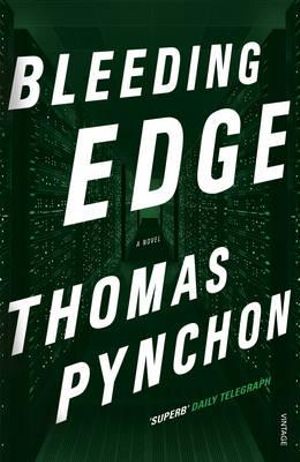

He signals her Jewishness by scattering Yiddishisms ("kvetch," "kvell" "zhlub," "schmatte") throughout the novel. She carries a Beretta even while delivering her two young sons each morning to the Otto Kugelblitz School, which, based on a Freudian heretic's balmy theories of personality development, is described as "A loony bin with homework, basically."Įstranged from Horst Loeffler, a goyish commodities investor who works in the World Trade Center, Maxine is a Jewish mother with Raymond Chandler mannerisms, "a paid-up member of the Yentas With Attitude local," as Pynchon clownishly puts it.
BLEEDING EDGE BY THOMAS PYNCHON LICENSE
Though her license has been revoked due to malpractice, she continues to operate Tail 'Em and Nail 'Em, a private agency in Manhattan that investigates scammers and embezzlers. Maxine Tarnow, the protagonist, is what the novel calls a certified fraud examiner. Preposterous names are another Pynchon trademark, and the new novel burdens characters with such ludicrous labels as Conkling Speedwell, Eric Outfield, Rocky Slagiatt, Nicholas Windust and Vyrva McElmo. When we are told that two characters are brought "to a standoff, ethnicity of your choice," Pynchon is advertising his superiority to a Mexican stereotype, while also exploiting it. Many of the figures of speech that Pynchon employs are inspired (Police hovering at the edges of no-parking zones are compared to "cheetahs at the fringes of antelope herds," and a prenuptial agreement is described as having "more riders on it than the subway.").īut others are not. "Pokémon, what do I know?" quips one Pynchon wit, "some West Indian proctologist, right?" Rather than smart, some of the preening word play seems just smart-ass. But before the twin towers collapse, intrepid readers must make their way through 300 pages of dense and occasionally dazzling prose.īeginning with its prankish title, "Bleeding Edge" revels in puns. So it is only natural that Pynchon, whose works reek with aioli, would take on the event that has generated more paranoid theories than anything since the assassination of John F. Specked with the dots that obsessive, shady figures insist on connecting, Pynchon's fiction is generated from the premise that, as a character in his latest work, "Bleeding Edge," puts it, "paranoia's the garlic in life's kitchen, right, you can never have too much."

It has been exactly 50 years since Thomas Pynchon's first novel, "V.," introduced him to the world as a co-conspirator with the darkest collusional fantasies in contemporary American culture.


 0 kommentar(er)
0 kommentar(er)
